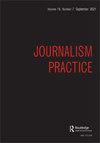International Broadcasting During Times of Conflict: A Comparison of China’s and Russia's Communication Strategies
IF 2
2区 文学
Q2 COMMUNICATION
引用次数: 1
Abstract
The vital role of international broadcasting during times of international con fl ict has gained increasing attention; however, national variations in terms of communication strategies have rarely been explored in depth. This study fi lls this research gap by providing a comparative analysis of the communication strategies of Chinese and Russian state-sponsored international broadcasters. By examining CGTN ’ s coverage of the South China Sea arbitration and RT ’ s coverage of the Ukraine crisis in 2014, we fi nd that the Chinese international broadcaster preferred o ffi cial Chinese sources and a peace frame during a time of con fl ict, whereas its Russian counterpart tended to engage with Western countercultural speakers and present con fl ict frames. We further interpret the two media ’ s di ff erent usage of sources and frames in the light of the media ’ s organizational culture and the sponsoring states ’ national identities. The research advances the scholarship on the increasingly intensive information war between the East and the West through the way international broadcasters cover international con fl icts. It enriches our understanding of the cultural and national dynamics underpinning the non-Western emerging countries ’ approaches of international communication.冲突时期的国际广播:中俄传播战略比较
国际广播在国际冲突期间的重要作用日益受到重视;然而,很少对传播战略方面的国家差异进行深入探讨。本研究通过对中国和俄罗斯国有国际广播公司的传播策略进行比较分析,填补了这一研究空白。通过对2014年中国国际电视台(CGTN)对南海仲裁案的报道和今日俄罗斯电视台(RT)对乌克兰危机的报道进行研究,我们发现,在冲突时期,中国国际电视台更倾向于使用中国官方消息来源和和平框架,而俄罗斯国际电视台则倾向于使用西方反主流文化演讲者并呈现冲突框架。我们进一步从媒体的组织文化和赞助国的民族认同来解读两种媒体对来源和框架的不同使用。本研究通过国际广播报道国际冲突的方式,推动了对东西方日益激烈的信息战的研究。它丰富了我们对支撑非西方新兴国家国际交流方法的文化和民族动态的理解。
本文章由计算机程序翻译,如有差异,请以英文原文为准。
求助全文
约1分钟内获得全文
求助全文
来源期刊

Journalism Practice
COMMUNICATION-
CiteScore
5.50
自引率
14.30%
发文量
111
期刊介绍:
ournalism Practice provides opportunities for reflective, critical and research-based studies focused on the professional practice of journalism. The emphasis on journalism practice does not imply any false or intellectually disabling disconnect between theory and practice, but simply an assertion that Journalism Practice’s primary concern is to analyse and explore issues of practice and professional relevance. Journalism Practice is an intellectually rigorous journal with all contributions being refereed anonymously by acknowledged international experts in the field. An intellectually lively, but professionally experienced, Editorial Board with a wide-ranging experience of journalism practice advises and supports the Editor. Journalism Practice is devoted to: the study and analysis of significant issues arising from journalism as a field of professional practice; relevant developments in journalism training and education, as well as the construction of a reflective curriculum for journalism; analysis of journalism practice across the distinctive but converging media platforms of magazines, newspapers, online, radio and television; and the provision of a public space for practice-led, scholarly contributions from journalists as well as academics. Journalism Practice’s ambitious scope includes: the history of journalism practice; the professional practice of journalism; journalism training and education; journalism practice and new technology; journalism practice and ethics; and journalism practice and policy.
 求助内容:
求助内容: 应助结果提醒方式:
应助结果提醒方式:


